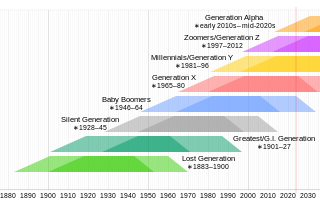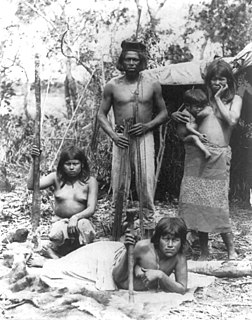
Ernest Miller Hemingway was an American novelist, short-story writer, journalist, and sportsman. His economical and understated style—which he termed the iceberg theory—had a strong influence on 20th-century fiction, while his adventurous lifestyle and his public image brought him admiration from later generations. Hemingway produced most of his work between the mid-1920s and the mid-1950s, and he was awarded the Nobel Prize in Literature in 1954. He published seven novels, six short-story collections, and two nonfiction works. Three of his novels, four short-story collections, and three nonfiction works were published posthumously. Many of his works are considered classics of American literature.

Individualism is the moral stance, political philosophy, ideology and social outlook that emphasizes the moral worth of the individual. Individualists promote the exercise of one's goals and desires and so value independence and self-reliance and advocate that interests of the individual should achieve precedence over the state or a social group while opposing external interference upon one's own interests by society or institutions such as the government. Individualism is often defined in contrast to totalitarianism, collectivism and more corporate social forms.

Leisure has often been defined as a quality of experience or as free time. Free time is time spent away from business, work, job hunting, domestic chores, and education, as well as necessary activities such as eating and sleeping. Situationist International proposes that leisure does not evolve from free time, and free-time is an illusory concept that is rarely fully "free"; economic and social forces appropriate free time from the individual and sell it back to them as the commodity known as "leisure". Certainly most people's leisure activities are not a completely free choice and may be constrained by social pressures. For example, people may be feel the need to spend time gardening to keep up with their neighbor's gardens or go to a party because of social pressures.

The Lost Generation was the social generational cohort that came of age during World War I. "Lost" in this context refers to the "disoriented, wandering, directionless" spirit of many of the war's survivors in the early postwar period. The term is also particularly used to refer to a group of American expatriate writers living in Paris during the 1920s. Gertrude Stein is credited with coining the term, and it was subsequently popularized by Ernest Hemingway who used it in the epigraph for his 1926 novel The Sun Also Rises: "You are all a lost generation".

Communitarianism is a philosophy that emphasizes the connection between the individual and the community. Its overriding philosophy is based upon the belief that a person's social identity and personality are largely molded by community relationships, with a smaller degree of development being placed on individualism. Although the community might be a family, communitarianism usually is understood, in the wider, philosophical sense, as a collection of interactions, among a community of people in a given place, or among a community who share an interest or who share a history. Communitarianism usually opposes extreme individualism and disagrees with extreme laissez-faire policies that neglect the stability of the overall community.

A subculture is a group of people within a culture that differentiates itself from the parent culture to which it belongs, often maintaining some of its founding principles. Subcultures develop their own norms and values regarding cultural, political and sexual matters. Subcultures are part of society while keeping their specific characteristics intact. Examples of subcultures include hippies, goths, bikers and skinheads. The concept of subcultures was developed in sociology and cultural studies. Subcultures differ from countercultures.

Personal life is the course or state of an individual's life, especially when viewed as the sum of personal choices contributing to one's personal identity.
Tribalism is the state of being organized by, or advocating for, tribes or tribal lifestyles. Human evolution has primarily occurred in small groups, as opposed to mass societies, and people naturally maintain a social network. With a negative connotation and in a political context, tribalism can also mean discriminatory behavior or attitudes, based on loyalty to one's social group.
Lifestyle is the interests, opinions, behaviours, and behavioural orientations of an individual, group, or culture. The term was introduced by Austrian psychologist Alfred Adler in his 1929 book, The Case of Miss R., with the meaning of "a person's basic character as established early in childhood". The broader sense of lifestyle as a "way or style of living" has been documented since 1961. Lifestyle is a combination of determining intangible or tangible factors. Tangible factors relate specifically to demographic variables, i.e. an individual's demographic profile, whereas intangible factors concern the psychological aspects of an individual such as personal values, preferences, and outlooks.

Charles Margrave Taylor is a Canadian philosopher from Montreal, Quebec, and professor emeritus at McGill University best known for his contributions to political philosophy, the philosophy of social science, the history of philosophy, and intellectual history. His work has earned him the Kyoto Prize, the Templeton Prize, the Berggruen Prize for Philosophy, and the John W. Kluge Prize.

The Theory of the Leisure Class: An Economic Study of Institutions (1899), by Thorstein Veblen, is a treatise on economics and a detailed, social critique of conspicuous consumption, as a function of social class and of consumerism, derived from the social stratification of people and the division of labour, which are social institutions of the feudal period that have continued to the modern era.
Self-ownership, also known as sovereignty of the individual or individual sovereignty, is the concept of property in one's own person, expressed as the moral or natural right of a person to have bodily integrity and be the exclusive controller of one's own body and life. Self-ownership is a central idea in several political philosophies that emphasize individualism, such as libertarianism, liberalism, and anarchism.

Robert Neelly Bellah was an American sociologist and the Elliott Professor of Sociology at the University of California, Berkeley. He was internationally known for his work related to the sociology of religion.

The iceberg theory or theory of omission is a writing technique coined by American writer Ernest Hemingway. As a young journalist, Hemingway had to focus his newspaper reports on immediate events, with very little context or interpretation. When he became a writer of short stories, he retained this minimalistic style, focusing on surface elements without explicitly discussing underlying themes. Hemingway believed the deeper meaning of a story should not be evident on the surface, but should shine through implicitly.
American civil religion is a sociological theory that a nonsectarian quasi-religious faith exists within the United States with sacred symbols drawn from national history. Since the 19th century, scholars have portrayed it as a cohesive force, a common set of values that foster social and cultural integration. Its current form was developed by sociologist Robert Bellah in 1967 in the article, "Civil Religion in America". According to Bellah, Americans embrace a common civil religion with certain fundamental beliefs, values, holidays, and rituals in parallel to, or independent of, their chosen religion.

Sociology of leisure or leisure sociology is the study of how humans organize their free time. Leisure includes a broad array of activities, such as sport, tourism, and the playing of games. The sociology of leisure is closely tied to the sociology of work, as each explores a different side of the work-leisure relationship. More recent studies in the field move away from the work-leisure relationship and focus on the relation between leisure and culture.
In sociology, traditional society refers to a society characterized by an orientation to the past, not the future, with a predominant role for custom and habit. Such societies are marked by a lack of distinction between family and business, with the division of labor influenced primarily by age, gender, and status.
Sheilaism is a shorthand term for an individual's system of religious belief which co-opts strands of multiple religions chosen by the individual usually without much theological consideration. The term derives from a woman named Sheila Larson, who is quoted by Robert N. Bellah et al. in their book Habits of the Heart as following her own "little voice" in a faith she calls "Sheilaism".

Pragmatic ethics is a theory of normative philosophical ethics and meta-ethics. Ethical pragmatists such as John Dewey believe that some societies have progressed morally in much the way they have attained progress in science. Scientists can pursue inquiry into the truth of a hypothesis and accept the hypothesis, in the sense that they act as though the hypothesis were true; nonetheless, they think that future generations can advance science, and thus future generations can refine or replace their accepted hypotheses. Similarly, ethical pragmatists think that norms, principles, and moral criteria are likely to be improved as a result of inquiry.
Ann Swidler is an American sociologist and professor of sociology at the University of California, Berkeley. Swidler is most commonly known as a cultural sociologist and authored one of the most-cited articles in sociology, "Culture in Action: Symbols and Strategies".









